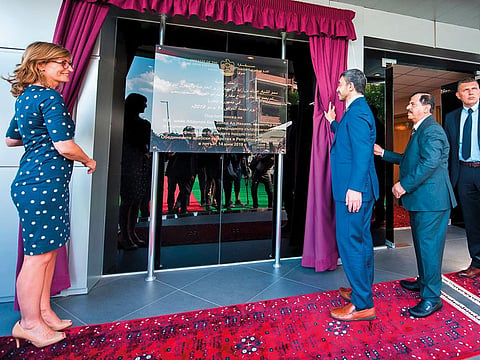Abdullah: State sponsor behind tanker attacks
Riyadh urges ‘decisive’ response to threats to energy supply

Sofia - UAE’s Minister of Foreign Affairs Shaikh Abdullah Bin Zayed Al Nahyan said on Saturday a “state sponsor” was involved in a May 12 attack on oil tankers in the Gulf. He did not mention attacks on two other tankers this week in the same area. The United States has said Iran was involved in both the May and the June incidents.
“Our conclusion is this has only been possible by a state-sponsored attack,” Al Nahyan told reporters after meeting his Cypriot counterpart in Nicosia, referring to the May attack. “We haven’t named the state, but we hope that we can further work with our friends and partners in preventing such escalations from moving forward,” he added.
His comments came as Saudi Arabia’s energy minister on Saturday called for a “swift and decisive” response to threats against energy supplies following twin attacks on tankers in the Strait of Hormuz. “There must be a swift and decisive response to the threat against energy supplies... created by the recent terrorist acts in the Arabian Gulf,” Khalid Al Falih was quoted as saying on the ministry’s Twitter page.
We depend on friendly nations, like Bulgaria, to confront the fascist regimes that seek to destroy the region, through peaceful means, spreading values of tolerance and success.Shaikh Abdullah Bin Zayed Al Nahyan, UAE’s Minister of Foreign Affairs and International Cooperation
Earlier, Shaikh Abdullah was in the Bulgaria to inaugurate the new premises of the UAE Embassy in Sofia. Addressing a press conference alongside Bulgarian Foreign Minister Ekaterina Zaharieva, Shaikh Abdullah said actors that seek to destabilise the Middle East and North Africa with their backward, extremist stances, impede the region’s ultimate development goals. “We depend on friendly nations, like Bulgaria, to confront the fascist regimes that seek to destroy the region, through peaceful means, spreading values of tolerance and success. Together, we can prevail over darkness,” he said.
Speaking about the attacks on May 12, he said these capabilities “are not present in illegal non-state actors or groups. These are disciplined processes carried out by a state. However, until now, there is insufficient evidence to point to a particular country.”
He said there were some 184 oil and other shipping vessels in the area where the first attacks took place in May.
“This was a real threat to global maritime shipping,” he warned. “We must work together to spare the region from escalation, and give the voice of wisdom a chance. We have to work together to remove these tensions. We hoped that the efforts of the Japanese Prime Minister Shinzo Abe would succeed. The German foreign minister was present a few days ago in the region, and we remain hopeful in attaining a broader framework for cooperation with Iran.”
He said that the 2015 nuclear deal had two major flaws. “The first being the lack of involvement with regional countries during the dialogue process. The second, not containing Iran’s ballistic missiles capabilities, and its interference in the internal affairs of neighbouring countries.”



